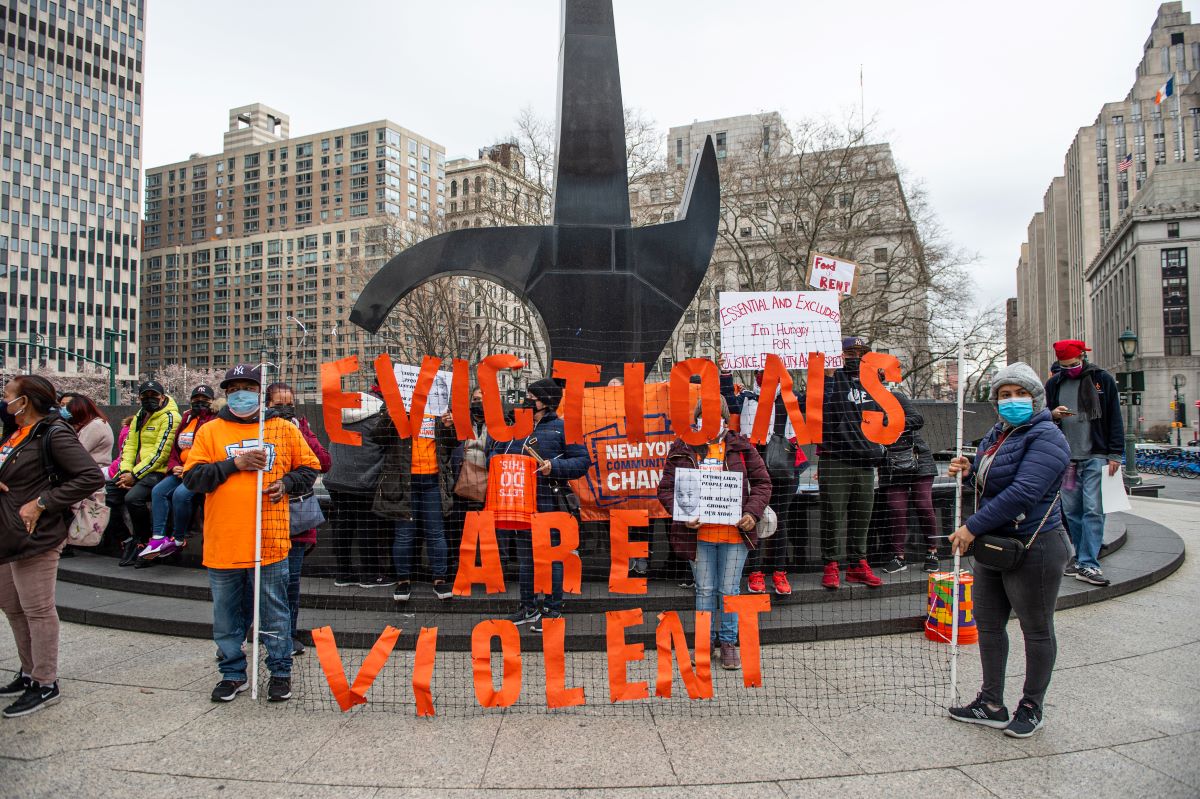We are marching onward to the end of the pandemic and the economic devastation it has caused. Indeed, the world has been turned on its side as unspeakable poverty and unemployment have taken hold, creating new obstacles while simultaneously posing potentially new solutions.
One safeguard that has served as a temporary measure in the wake of destruction is the national eviction moratorium. This modern piece of legislation was originally drafted into the CARES ACT and has since been renewed on several occasions. In brief, the eviction moratorium bars landlords from legally evicting tenants due to nonpayment for the duration of the COVID-19 crisis.
Corporate landlords have made some efforts to skirt around the law and persuade tenants into evacuating properties. However, for the most part, they have been largely unsuccessful in this abhorrent endeavor, and many evictions have been avoided.
As time wears on, studies are beginning to show that the eviction moratorium (when abided by) saves lives, reduces homelessness, and decreases the spread of infectious diseases, including the COVID-19 virus.
On March 29th of this Year, the CDC and President Biden Moved to Continue the Ban on Evictions Through June 30th
This was a bold, impassioned move that happened right in the nick of time for millions of renters. The previous moratorium deadline was March 31st, which means that if this legislation had not passed, approximately 12 million delinquent renters would have been at risk for homelessness by way of eviction. At the beginning of March, the CEO of the National Low Income Housing Coalition, Diane Yentel, made the following comment to CNN reporters:
“Extending the order is necessary to ensure that COVID-19 doesn’t start to spread through mass evictions, and in order to ensure that this emergency rental assistance gets out and does what it’s intended to do.”
How Do We Know the Eviction Moratorium is Reducing the Spread of COVID-19?
At the onset of this public health crisis, much of our national legislation was rooted in educated guesses. Housing advocates and policymakers were merely projecting the idea that homelessness would increase the spread of COVID-19.
This idea was based on several supportive facts:
- Infectious diseases are known to spread more rapidly through homeless populations.
- Most pre-pandemic era homeless shelters were crowded. Many were beyond capacity, their residents forced to sleep in stairwells and crowded hallways.
- Any place where humans could be found lying within close proximity of one another was believed to be a breeding ground for COVID.
Now, the numbers are in, supporting the housing advocates’ and policy makers’ original claim. A Duke University research study, which was released in January of 2021, confirms that the eviction moratorium has saved thousands of lives and reduced deaths caused by COVID-19 by 11%.
The paper, which was the work of five esteemed professionals, further posits that if the moratoriums had been in place from the beginning of the pandemic, COVID-19 infection rates could have been reduced by 14.2%. Mortalities could have dropped a whopping 40.7%.
While we cannot change our past, we can learn from it and better prepare for the future.
The latest moratorium extension will likely save thousands of more lives while reducing the risk for infection. But that’s just one selling point amid a multitude of potential advantages. According to Vox, the eviction moratorium has spared approximately 40 million renters from the desolate state of eviction.
As many housing experts can attest, eviction is a common pathway into homelessness. The precise number of homeless people who found themselves unhoused due to eviction is difficult to tally. A 2017 survey conducted in California claimed it could be as high as 14%.
What is clear is that a lack of affordable housing has been the leading cause of homelessness for many years now. Many evicted people were rent-burdened or severely rent-burdened, to begin with, making unaffordable rent a leading cause of eviction.
When you add to this the premise that nearly 40 million renters were rescued from eviction through the moratorium, it’s clear that if there was no moratorium, eviction could have quickly become the leading cause of homelessness for the coming generations.
This means that the moratorium effectively accomplished all the following goals:
- Reduced the spread of the COVID-19 virus
- Reduced mortality through COVID-19 infection
- And reduced homelessness by astronomical proportions
The Toll of Homelessness on US Healthcare
Preventing homelessness does wonders for the US healthcare system. Why? People who are experiencing the horrors of homelessness are four times more likely to be hospitalized than their housed peers.
Reasons for escalated hospitalization rates within the homeless community range from being more vulnerable to infection to malnutrition to being the victims of vicious assaults. At first glance, it might appear as if the eviction moratorium is only saving lives regarding COVID-19. Once you factor in the weight of homelessness on the US healthcare system and the rate at which eviction could inflate homelessness, it becomes clear that this recent extension is potentially saving tens of millions of lives.
Permanent Solutions to the Homeless Crisis Must Become a Top Priority
When paired with financial compensation programs like rent relief, legislation like the eviction moratorium keeps eviction at bay, which is undoubtedly a step in the right direction. However, now that the pandemic has opened our eyes to homelessness and the astonishing number of people experiencing it or vulnerable to it, we must bring forth more permanent changes.
Talk to your legislators about their plans to close the homeownership gap, prevent eviction, and make housing affordable, available, and safe for all.












